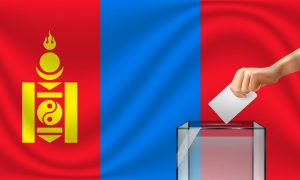Mongolia’s 2024 parliamentary election will take place on June 28, and political parties have officially released the names of their candidates. With the enlarged legislative branch – expanding from 76 to 126 seats – this year’s election will be one of the most significant in modern Mongolia’s history. This election also can illustrate the state of political parties and their influence on Mongolia’s political life.
According to the General Election Committee of Mongolia, 23 political parties and two coalitions will run campaigns, starting on June 14 and continuing for two weeks. Based on currently available open-source information, the Democratic Party (DP), Mongolian People’s Party (MPP), Khun Party, Civic Union Party, and National Coalition have released their candidates’ names.
Candidates from traditional political parties such as the DP and MPP aim to gain a majority if not supermajority. The additional 50 seats will create new opportunities for parties under a mixed electoral system. The merging of electoral districts from 26 to 13 will also have an impact on new parties and new faces.
After assessing the latest candidate lists, the Khun Party and the MPP are believed to have the best chance in the upcoming election. Predictions are flying on social media platforms as political activists and ex-politicians weigh in. The DP is expecting to gain 15-20 seats in the parliament and the Khun Party expects to have more than 30 seats. Currently, Mongolia’s parliament is dominated by the MPP, which holds 61 of 76 seats, followed by the DP in distant second place with 11 seats.
People with diverse professional backgrounds – such as journalists, engineers, environmentalists, rights activists, non-profit workers, education advocates, and economics and legal experts – are running campaigns. Assessing the list of all parties and coalitions, there is a broad sense of inclusivity, diversity, and youth-focused selection.
The ruling MPP – which currently holds both the president and prime minister posts – listed 126 candidates, including incumbent parliamentarians like Tsogtbaatar Damdin and Unurbolor Damdinsuren. Highly educated leaders from the younger generation are also included such as Dr. Luvsanjamts Ganzorig, an engineer and a Tokyo University graduate; Dr. Bum-Ochir Dulam, a leading anthropologist and scholar who studied at Oxford; and Batnairamdal Otgonshar, a former minister of road and transportation and a Harvard-graduate.
Notably, the MPP leadership excluded former Prime Minister Batbold Sukhbaatar from running. Batbold is currently involved in a legal battle with the U.S. Department of Justice after being accused of systemic corruption.
The Khun Party listed 78 highly electable candidates such as Dr. Otgontugs Banzragch, a human rights activist, and Munkhdul Badral, a Lee Kuan Yew School of Public Policy graduate currently serving as a Sukhbaatar District Council representative and chair of the the Human Rights Subcommittee.
Despite the emergence of a new generation of leaders and social activists, there are plenty of ex-parliamentarians seeking to return to the legislature.
The Democratic Party has re-introduced ex-parliamentarians Bayartsogt Sangajav, Narantuya Zagdkhuu, and Temuujin Khishigdemberel as more experienced politicians. The DP also included the younger generation, such as Shijir Ulziikhuu, who previously served as the press secretary to the Office of President Battulga Khaltmaa. Moreover, in a surprising move, Battulga himself will be competing for a seat in Khuvsgul, Bulgan, and Erdenet.
Editor’s note: Initially Nomingerel Khuyag, a lawyer practicing constitutional law, was on the DP party list. She claims that sometime after the DP Congress, her name was removed. Nomingerel has expressed outrage, and some younger party members have threatened to pull their party membership over her removal.
In an effort to strengthen the DP’s political influence and to gain more seats in the parliament, the Democratic Youth Union (DYU), whose members exceed 90,000, has contributed tremendously. The DYU pushed the party leadership to be more inclusive and diverse, and support new faces.
While notable parties such as the DP, MPP, and Khun Party are paying attention to up-and-coming figures in the selection of their candidates, some ex-parliamentarians who left these political parties have started new parties and coalitions to increase their chance for parliamentary seats.
A former DP member and an ex-parliamentarian, Oyungerel Tsedendamba, established her own party, the Civic Union Party. The party will run 59 candidates, including herself.
Nomtoibayar Nyamtaishir, a former MPP member and the oldest son of the founder of a major mining conglomerate, is running the National Coalition, which listed 76 candidates. In his press release, Nomtoibayar stated that “one of the National Coalition’s goal is to separate businesses from politics, implementing policies that help the people to get richer, not just businesses.” He also emphasized growing government spending and tax incentives. Of the National Coalition’s 76 candidates, 35 (46 percent) are women, well above the new 30 percent quota introduced in Mongolia’s constitutional reform last year.
This year’s parliamentary election comes amid an increasingly unstable regional order. While Mongolia’s enlarged legislative branch can strengthen the government’s service provision and representation, the decisions will also have an enormous effect on how Mongolia manages its natural resources. That’s why former President Bagabandi Natsag stated, “I hope that the younger generation will participate in this election. I think this election will be a policy-based one.”

































